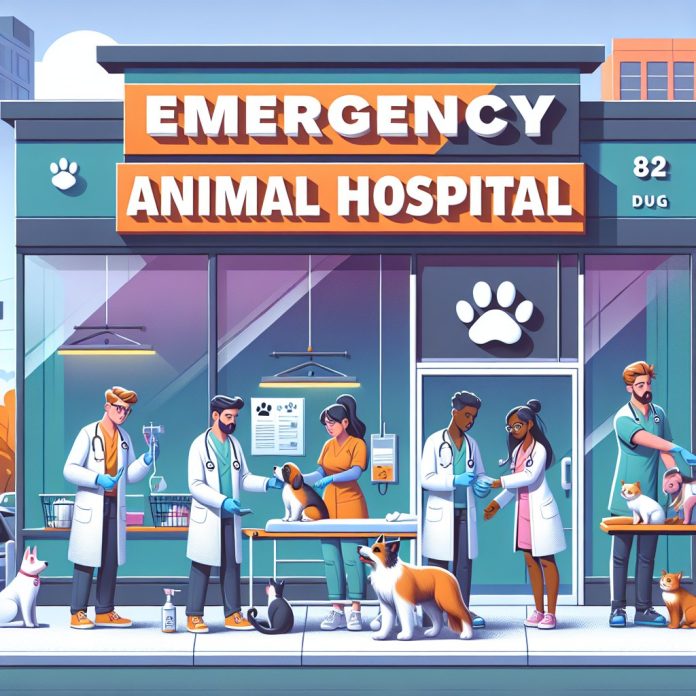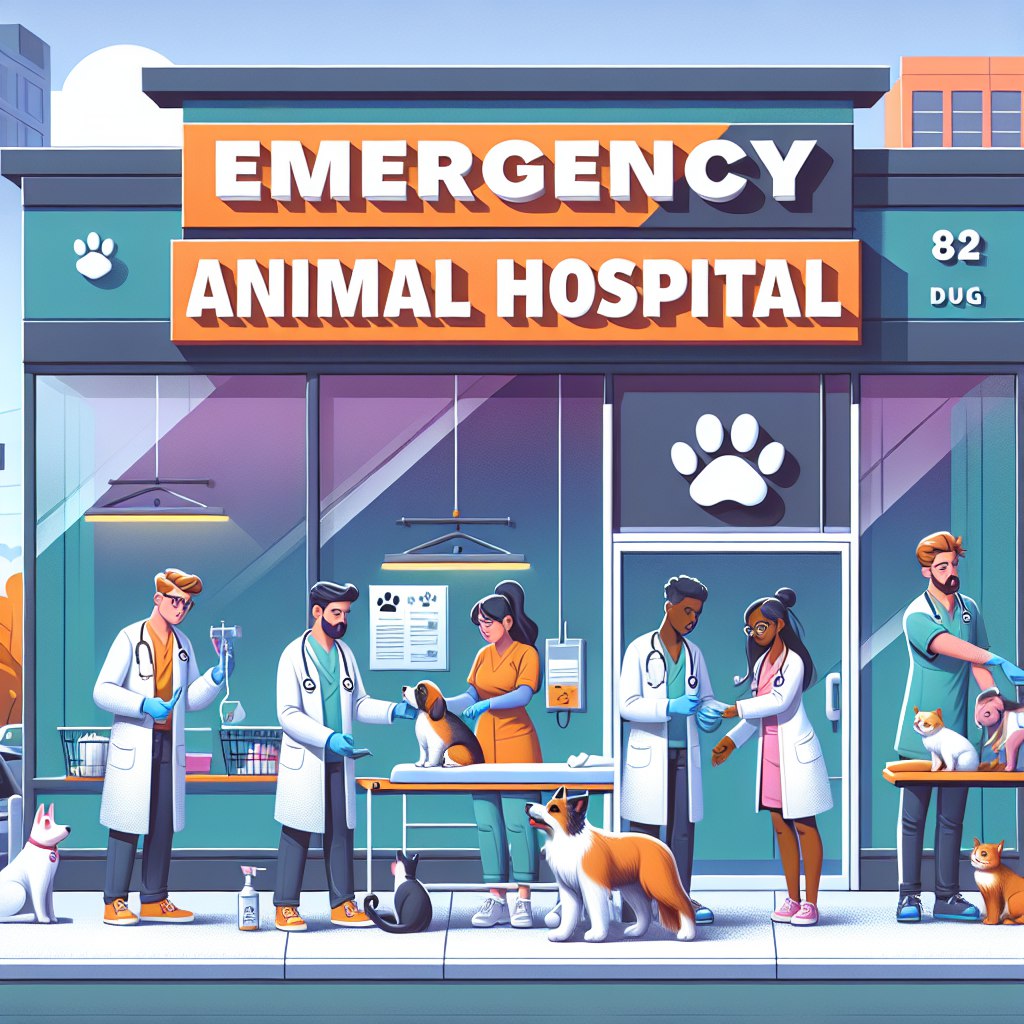
🐾 The Essential Guide to Emergency Animal Hospitals
🌟 Introduction
Every pet owner dreads the moment when their beloved animal experiences a health crisis. In such situations, finding an “emergency animal hospital” that offers immediate and expert care is crucial. This guide will provide comprehensive insights into what an emergency animal hospital is, the services they offer, how to choose the right one, and what to expect during an emergency visit. Understanding these aspects will help you be better prepared to handle pet emergencies efficiently and calmly.
🌟 What is an Emergency Animal Hospital?
Definition and Purpose
An emergency animal hospital is a specialized veterinary facility designed to handle urgent and critical health issues in pets. These hospitals operate 24/7, providing immediate medical attention to animals in need. They are equipped with advanced diagnostic tools and staffed by veterinarians trained in emergency and critical care.
Differences from Regular Vet Clinics
Unlike regular vet clinics that operate during standard business hours, emergency animal hospitals are available round the clock. They are prepared to handle a wide range of urgent health problems, from severe injuries to sudden illnesses, ensuring your pet receives timely and comprehensive care.
🌟 Services Offered by Emergency Animal Hospitals
Advanced Diagnostics
Emergency animal hospitals are equipped with advanced diagnostic tools such as X-rays, ultrasounds, and blood testing machines. These tools enable veterinarians to quickly and accurately diagnose health issues, which is critical in emergency situations.
Emergency Surgery
Many emergencies require immediate surgical intervention. Emergency animal hospitals have surgical suites and experienced surgeons on staff to perform life-saving procedures when necessary.
Intensive Care Units
For pets requiring constant monitoring and care, emergency animal hospitals provide intensive care units (ICUs). These units are equipped to handle critical patients, offering continuous care and advanced treatment options.
Specialized Care
Some emergencies may require the expertise of specialists, such as cardiologists, neurologists, or oncologists. Emergency animal hospitals often have specialists on call to provide targeted care for complex health issues.
🌟 How to Choose the Right Emergency Animal Hospital
Conduct Thorough Research
Start by researching emergency animal hospitals in your area. Look for facilities with good reviews and testimonials from other pet owners. Websites, social media, and online forums can provide valuable insights into the quality of care provided by different hospitals.
Consider Proximity
In an emergency, every second counts. Choose an emergency animal hospital that is close to your home to minimize travel time. Knowing the quickest route to the hospital can save valuable time during a crisis.
Visit Potential Hospitals
If possible, visit the hospitals you are considering. Assess the cleanliness of the facility, the friendliness of the staff, and the availability of advanced medical equipment. A visit can help you feel more confident about your choice.
Ask About Emergency Protocols
Inquire about the hospital’s emergency protocols. Understanding their procedures for handling different types of emergencies can give you peace of mind knowing that your pet will receive prompt and appropriate care.
🌟 What to Expect During an Emergency Visit
Initial Triage
Upon arrival, your pet will undergo an initial triage to assess the severity of their condition. This step ensures that the most critical patients receive immediate attention. Be prepared to provide detailed information about your pet’s symptoms and medical history.
Diagnostic Testing
Depending on the nature of the emergency, the vet may recommend diagnostic tests such as blood work, X-rays, or ultrasounds. These tests help identify the underlying issue and guide the treatment plan.
Developing a Treatment Plan
Based on the diagnostic results, the veterinarian will develop a treatment plan. This may include medication, surgery, or other interventions. The vet will discuss the options with you, explaining the benefits, risks, and costs associated with each treatment.
Continuous Monitoring and Care
During their stay, your pet will receive continuous monitoring and care. The veterinary team will provide updates on your pet’s condition and progress. In cases requiring intensive care, pets will be closely monitored in the ICU.
🌟 Preparing for a Pet Emergency
Prepare an Emergency Kit
Having an emergency kit ready can make a significant difference during a crisis. Include items such as your pet’s medical records, a list of medications, a first aid kit, and contact information for your regular vet and the nearest emergency animal hospital.
Recognize Emergency Symptoms
Familiarize yourself with common symptoms that indicate a medical emergency, such as difficulty breathing, severe vomiting or diarrhea, sudden lethargy, or obvious signs of pain. Early recognition of symptoms can prompt quicker action and improve outcomes.
Stay Calm and Act Quickly
In an emergency, staying calm and acting quickly is crucial. Panicking can waste valuable time and make the situation more stressful for both you and your pet. Having a clear plan and knowing where to go will help you stay composed.
🌟 Cost Considerations and Payment Options
Understanding the Costs
Emergency veterinary care can be expensive, especially for complex treatments or surgeries. It’s essential to be aware of the potential costs and plan accordingly. Discussing the estimated costs with the vet beforehand can help you understand what to expect.
Explore Payment Options
Many emergency animal hospitals offer various payment options, including payment plans, pet insurance, and financing options like CareCredit. Exploring these options in advance can help alleviate financial stress during an emergency.
Consider Pet Insurance
Pet insurance can be a valuable tool for managing emergency veterinary expenses. Research different insurance plans to find one that suits your budget and covers a wide range of emergencies and treatments.
🌟 Common Emergencies Handled by Animal Hospitals
Trauma and Injuries
Emergency animal hospitals frequently handle trauma cases, such as injuries from accidents, falls, or fights with other animals. These situations often require immediate medical attention and possibly surgery.
Poisoning
Pets can accidentally ingest toxic substances like household chemicals, plants, or human medications. Emergency hospitals are equipped to handle poisoning cases, providing necessary treatments like induced vomiting, activated charcoal, or intravenous fluids.
Acute Illnesses
Sudden onset of severe illnesses, such as infections, respiratory distress, or organ failure, are common reasons for emergency visits. Prompt diagnosis and treatment are critical in these situations to improve the chances of recovery.
🌟 Final Thoughts
Be Prepared
Being prepared for a pet emergency can make a significant difference in your pet’s outcome. Knowing the location of the nearest emergency animal hospital, recognizing the signs of a medical emergency, and having a plan in place will help you respond quickly and effectively.
Peace of Mind
Choosing a reliable emergency animal hospital provides peace of mind, knowing that expert care is available whenever needed. Regularly reviewing your emergency plan and updating it as necessary will keep you ready to handle any unexpected health issues your pet may face.
🌟 Conclusion
Finding the right “emergency animal hospital” is crucial for ensuring your pet receives prompt and effective care during a health crisis. By understanding the services offered, knowing how to choose the right hospital, and being prepared for emergencies, you can ensure your pet’s well-being even in the most critical situations. Prioritize research, visit potential hospitals, and keep an emergency kit ready to handle any unexpected situations with confidence. Your preparedness can make a significant difference in your pet’s health and recovery, giving you the peace



















